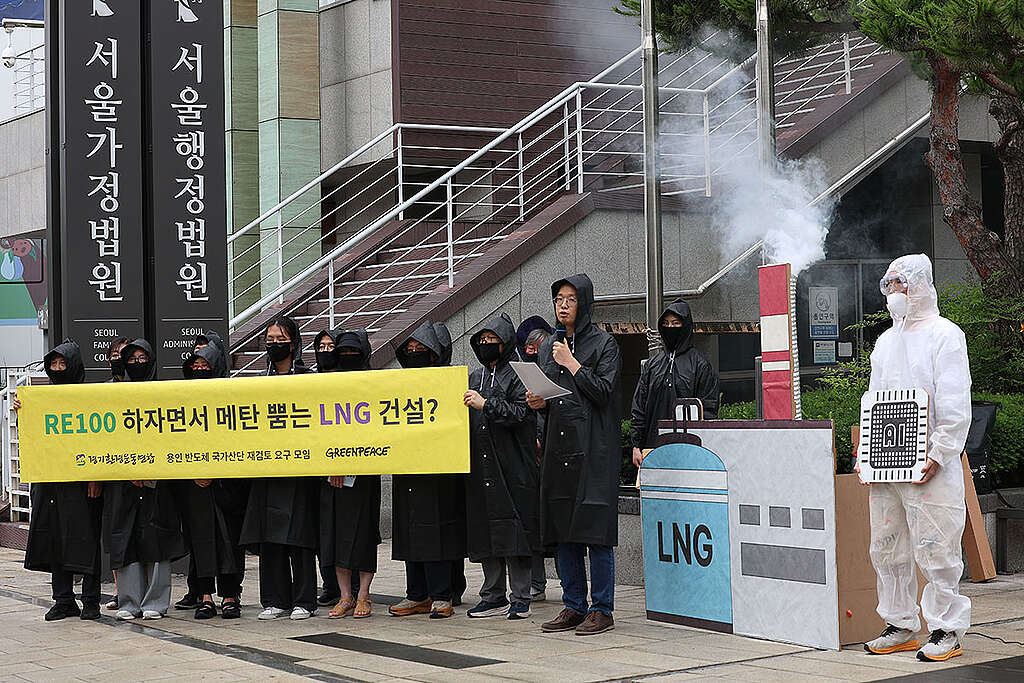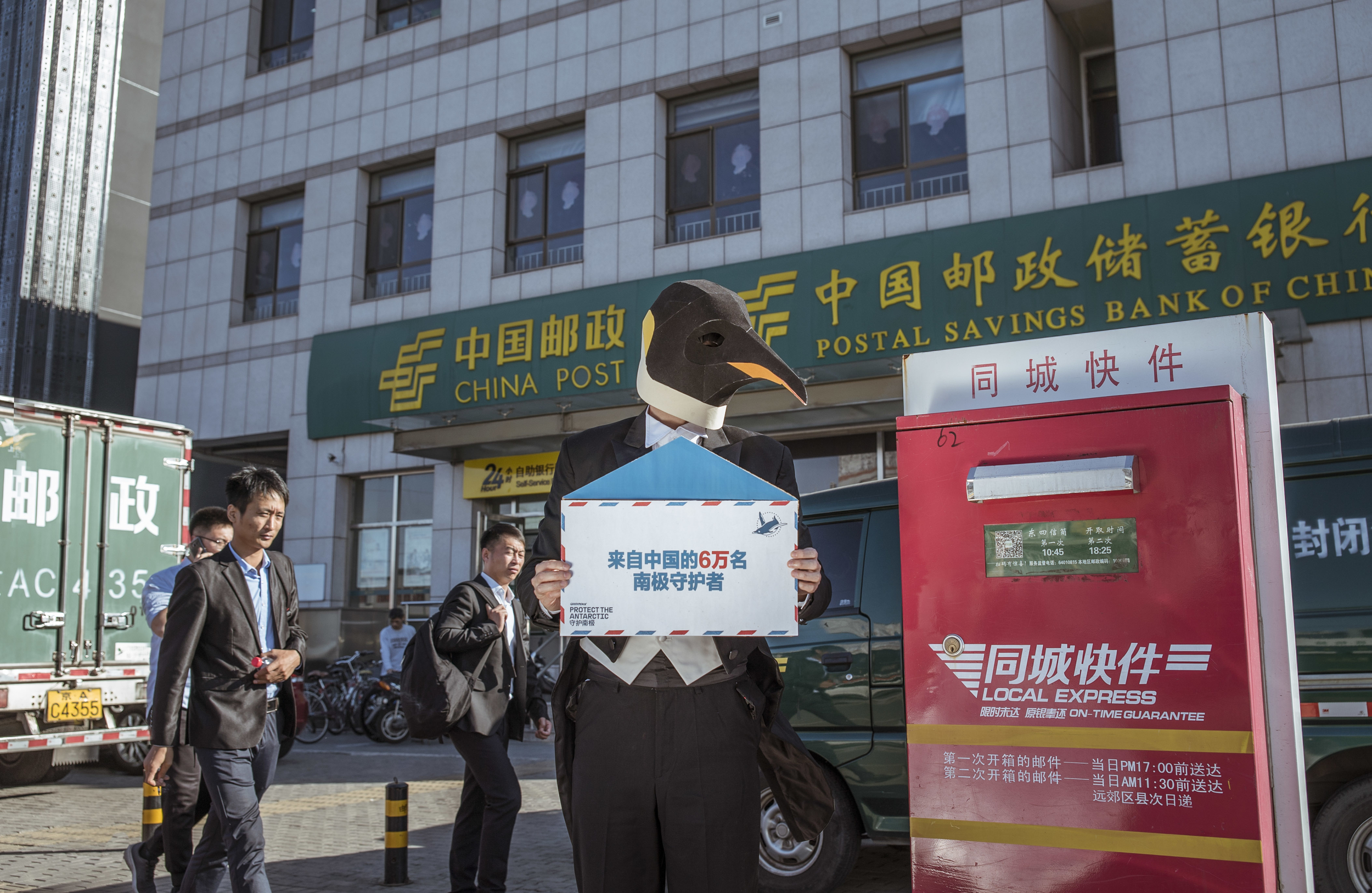SEOUL – The GyeongGi Korea Federation for Environmental Movements, Greenpeace East Asia, and 450 citizen plaintiffs have filed a lawsuit against the Minister of Trade, Industry and Energy (MOTIE), seeking to revoke the government’s April approval of six LNG power plants in the Yongin Semiconductor National Industrial Complex. [1]
Outside the courthouse, activists staged a symbolic performance around a model of an LNG power plant. One activist wore a clean room suit, resembling the uniform of semiconductor manufacturing facility personnel, and others held up a banner that read, “No more fossil gas, Go renewables.”
The six LNG power plants were permitted without formal environmental and climate impact assessments in violation of the Environmental Impact Assessment Act and national climate law. Samsung Electronics is expected to be the primary tenant of the approximately 360 trillion KRW (260 billion USD) national industrial complex, a critical site for high-tech manufacturing.

Yeonho Yang, Senior Climate & Energy Campaigner at Greenpeace East Asia, said:
“This case is not just about one power plant project – it’s about whether a government can lawfully ignore its climate obligations, bypass its citizens, and greenlight fossil fuel expansion in the middle of a planetary crisis. The approval of the six LNG plants breaches Korea’s own Carbon Neutrality Act and contradicts one of President Lee’s key campaign promises, the RE100 industrial zone pledge. We demand a rights-based energy transition, not dangerous and costly distractions like fossil gas.”
The six new LNG power plants in the Yongin Semiconductor National Industrial Complex are projected to emit nearly 10 million tonnes of greenhouse gases annually, equivalent to the emissions from approximately 2.3 million gasoline-powered passenger vehicles driven for one year. [2][3] Although the area around the Yongin complex has ample potential for renewable energy generation, renewable energy alternatives were not formally assessed during the permitting process. [4]
The case challenges South Korea’s Environmental Impact Assessment (EIA) system. The EIA Act is designed to ensure that environmental risks are thoroughly assessed before a project is approved. However, the methods, scope of application, and timing for such assessments are prescribed by a Presidential Decree issued under the Act. Unfortunately, the Presidential Decree of the Act allows projects to be approved first and only requires environmental review later, at the construction plan approval stage. As a result, the EIA system is rendered ineffective.
Seokyeon Kim, attorney representing the plaintiffs, said:
“These six LNG power plants would lock in high emissions for decades to come and violate Korea’s Carbon Neutrality Act, which mandates efforts to reduce greenhouse gas emissions. The Court must consider not only legal violations, but also the government’s duty to prevent foreseeable climate harm. This case is about restoring public trust and accountability in climate-related decision-making.”
The lawsuit not only challenges the legality of the LNG approval process but also reflects a growing global trend of using the courts to hold governments accountable for climate inaction. In May 2025, the European Free Trade Association (EFTA) Court affirmed that climate impacts, including Scope 3 emissions, must be assessed before granting development permits.
Given urgency to address the climate crisis, international legal standards are increasingly applied to ensure effective and appropriate action on climate. As such, domestic systems must now catch up to the imperative to align principles of climate justice, public participation, right to information and environmental integrity to the adjudication of legal disputes.
Hyejin Chae, Senior Legal Coordinator at Greenpeace East Asia, said:
“We hope this case adds momentum to the global shift where governments are held accountable for pushing harmful fossil fuel projects. Our lawsuit exposes the gap between the emerging application of international standards and Korea’s permit‑first practice, and shows how local action can align national policy with global climate justice.”
END
Notes
Photos from outside the courthouse are available here
[1] The lawsuit was filed in the Seoul Administrative Court.
[2] Source: Yongin Semiconductor National Industrial Complex Climate Change Impact Assessment Final Report, 9,774,893 tonnes
[3] Source: EPA, Greenhouse Gas Equivalencies Calculator
[4] Source: No More Fossil Fuels: Pathway for Samsung and Korea to Build a Green Yongin Semiconductor Cluster, Greenpeace East Asia & Solutions For Our Climate, 2025.
Media Contacts
Euihyun Choi, Communications Officer, Greenpeace Seoul, +82 10-5950-0369, [email protected]
Erin Newport, International Communications Officer (Taipei), +886 958 026 791, [email protected]



